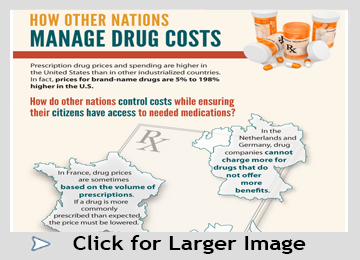Synopsis
Focusing on the U.S. Medicare program and four European public health care systems, researchers examined how governments’ decisions on prescription medications that are eligible for reimbursement affect patients’ access to new cancer treatments. More drugs are approved and available in the United States, but Medicare does not take into account new medications’ cost-effectiveness relative to existing therapies. In contrast, the evidence-based approaches used in Europe lead to fewer approved drugs but also to lower costs for patients and insurers.

The Issue
When making drug coverage decisions, health care payers in many European nations consider how well a new prescription drug performs and how affordable it is relative to existing therapies. In the U.S., payers rarely examine new drugs’ comparative benefit or cost-effectiveness. To explore how these differing approaches affect consumers’ access to expensive new drugs, Commonwealth Fund–supported researchers compared approval and reimbursement decisions in the U.S. and in four European countries for 29 cancer drugs between 2000 and 2011. The study included publicly covered patients only—in the U.S., Medicare beneficiaries.
Key Findings
- Over the 2000–2011 period, the average price of the 29 cancer drugs in Europe was 10 percent lower than the average U.S. average wholesale price, and 8 percent lower than the average U.S. sales price and Medicare Part D price.
- In the U.S., there were no official delays between drug approval and Medicare’s decision to reimburse. In England and Wales, it took an average of eight months for drugs to be reviewed, during which time they were not included among covered benefits. In the Netherlands, drug reimbursement decisions took an average of six months, while in France they took an average of 12 months.
- All but one of the 29 drugs approved in the U.S. between 2000 and 2011 were covered by Medicare. Beneficiaries paid 20 percent coinsurance for physician-administered drugs and a median rate of 33 percent coinsurance for self-administered drugs; in many cases, this translated into thousands of dollars annually. Ninety-seven percent of the drugs were covered in Germany, with minimal cost-sharing; 86 percent were covered in France, with no-cost sharing; 80 percent were covered in the Netherlands, with no cost-sharing; and 44 percent were covered in England and Wales, with minimal cost-sharing.
Addressing the Problem
Spending on cancer treatments in the U.S. has grown substantially in recent years, leading to higher costs for health care purchasers as well as patients. Medicare beneficiaries who are able to pay higher out-of-pocket costs or who have supplemental insurance have better access to care than those who do not. In Europe, fewer drugs are covered than in the U.S., but those medications deemed to be cost-effective are made more affordable for payers and patients. Currently, Medicare payers are legislatively barred from considering costs when making coverage decisions. The authors suggest that U.S. policymakers consider a systematic process of evidence-based decision-making when weighing the clinical and economic value of new drugs.
About the Study
In both the U.S. and Europe, regulatory bodies approve new drugs entering the market. Consumers’ access to approved drugs is then shaped by whether the drugs are included in their insurers’ formularies as well as the conditions and cost-sharing linked to their use. For this study, researchers compared the reimbursement decisions for 29 cancer drugs entering the market in the U.S. and four European health systems (England/Wales, France, Germany, and the Netherlands) over the period 2000 to 2011. The study focused on publicly covered patients—in the U.S., Medicare beneficiaries.
The Bottom Line
There is a trade-off between the European and U.S. approaches to covering expensive cancer drugs. More oncology drugs are available in the U.S. than in European nations. But among drugs covered by European health systems, prices are modestly lower and therefore more affordable for payers and patients.